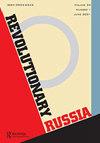Science, State, and Culture: Decorations for the 1967 October Festival
IF 0.2
2区 历史学
Q2 HISTORY
引用次数: 0
Abstract
The October Revolution festival, introduced as a public holiday in Soviet Russia in 1919, was always both a reflection of the contemporary political situation and an instrument to impose necessary ideological concepts. This article focuses on the festival designs completed by the experimental group from Moscow, Dvizhenie, for the fiftieth anniversary. It analyses the focus of state propaganda in 1967, which was centred on placing space exploration and technological advancement within the perspective of the entire history of revolutionary commemorations, and explores the state of freedom of expression and the nature of ideological crisis in the period.科学、国家与文化:1967年十月节的装饰
1919年,十月革命节在苏俄被作为公共假日引入,它始终既是当代政治形势的反映,也是强加必要意识形态概念的工具。本文重点介绍了来自莫斯科的实验小组Dvizhenie为庆祝五十周年而完成的节日设计。它分析了1967年国家宣传的重点,即将空间探索和技术进步置于整个革命纪念历史的视野中,并探讨了这一时期的言论自由状况和意识形态危机的性质。
本文章由计算机程序翻译,如有差异,请以英文原文为准。
求助全文
约1分钟内获得全文
求助全文

 求助内容:
求助内容: 应助结果提醒方式:
应助结果提醒方式:


